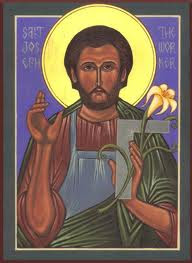Those with special devotion to St. Joseph, the just spouse of Mary and foster-father of Jesus, were very happy to hear the news from the Vatican in June that Pope Francis had approved the recommendation to include St. Joseph's name in all Eucharistic Prayers at Mass, immediately after the invocation of the Blessed Mother. St. Joseph is already named in the First Eucharistic Prayer (the Roman Canon). This inclusion was approved by Pope John XXIII around 1960. Now you will hear St. Joseph's name in all the Eucharistic Prayers, for daily and Sunday Masses.
The other picture of Joseph is that of worker or carpenter of Nazareth. In Matthew 13:55, the astonished people in the synagogue of Nazareth rhetorically ask, " Is [Jesus] not the carpenter's son?" In John "murmuring Jews" are opposed to Jesus' teaching on the bread of life and ask, "Is this not Jesus, the son of Joseph? Do we not know his father and mother?" (6:42) The earliest recorded published devotion to St. Joseph comes only in the 8th century, but March 19 is established as his feast day as early as the 11th century. In the 19th century Pope Pius IX names St. Joseph the patron of the universal church, and Pope Leo XIII called on all Catholic to pray to St. Joseph for intercession.
In 1955 Pope Pius XII established a second feast day, May 1, specifically for St. Joseph the Worker. Many people at the time saw it as a Christian response to the Communists' celebration of military and political power (particularly in the then-Soviet Union) on "May Day." But this designation also reflected the Catholic Church's positive view of the value of labor, working men and women, and unions. Atheistic communism has passed into the "dustbin of history," but the value of May 1 honoring St. Joseph the Worker continues to grow. It is through work that human beings build up their families, homes, towns and cities, and the world at large. Human labor is always to be honored, whether it be through the sweat of farming, manufacturing or nursing, the drudgery of the assembly line, cash register or housework, or the creativity of teaching, business entrepreneurship and the arts.
I find it significant that way back in 1888 Bishop John Tuigg, the third bishop of Pittsburgh, named the second parish in New Castle after St. Joseph the Worker. New Castle was already known for its workers in manufacturing plants and on the canals and railroads. Over the next three decades the waves of European immigrants seeking work who came to New Castle would push the Diocese of Pittsburgh to open parishes for Italian immigrants (St. Vitus in 1901; St. Lawrence, Bessimer, in 1906; St. Lucy in 1913), Slovak immigrants (St. Michael in 1910), and Polish immigrants (Madonna of Czectochowa in 1902; SS. Philip and James in 1923). This year is the 125th anniversary of St. Joseph the Worker Parish. In October Bishop David Zubik, the twelfth bishop of Pittsburgh, will come up to help us celebrate this anniversary.
Labor Day in our country is at one and the same time a way to honor all workers, to pray for the unemployed who are seeking honest work at a living wage, and to rest from our labors to enjoy family and friends One of my parishes, appropriately St. Joseph the Worker, will host a Mass at 9:00 a.m. on Labor Day. Let us pray for St. Joseph, the loving husband of Mary and woodworker of Nazareth, to guide us in our work on Earth.


No comments:
Post a Comment